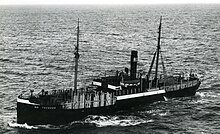Shipping company Rud. Christian. Gribel
The shipping company Rud. Christian. Gribel was founded in Stettin in 1773 as a wine trading company with sailing ships , the last ships were sold in 1965 and the company was closed in 1979.
Founding of the trading house in 1773
Rudolf Christian Gribel (1747–1831) from Kirchwärder near Bergedorf had been an apprentice in a Hamburg wine shop. In 1767 he got a job with the Stettin merchant Tilebein. Together with Johann Friedrich Noack, he founded a wine shop in Stettin in 1773 under the name Noack & Gribel . At this time, the French wine trade was particularly flourishing. The company did well. By 1777 the two partners were able to quadruple their capital contributions. By marrying a step-niece of the commercial councilor Peter Artzberger, who was important in the Stettin merchants, Gribel became the more important of the two shareholders. The company was therefore renamed Gribel & Noack in 1776 . Under the name Rud. Christian. Gribel he founded his own new company in 1779, actually as a continuation of the Artzberger trading house, whose warehouse on the Lastadie and house in the Große Oderstraße he had taken over. From 1780 Rudolf Christian Gribel owned a third ship part of the Johannes , until 1782 he was a shareholder in six ships. In addition to the wine trade as the main business, the trade in other goods took up more and more space and regular connections were established. For example the first regular service between Szczecin and South America . With growing sea trade, more liner services to the Baltic and North Sea ports were added.
Successor Friedrich Wilhelm Gribel and Gottlieb Theodor Gribel
Friedrich Wilhelm Gribel had been a partner in his father's business since 1805 and expanded the flourishing shipping branch. The collapse of Prussia in 1806 during the Napoleonic War led to heavy burdens for the entire merchant class. While the continental blockade brought trade almost completely to a standstill, the French occupying forces imposed high contributions on the merchants. The Gribel share in October 1807 was more than 22,000 thalers, with additional costs of more than 15,000 thalers added by the end of 1808. In 1810 the Prussian authorities confiscated a shipload worth almost 19,000 thalers because of the importation of prohibited goods. Despite these losses, it was possible to survive the crisis that followed after the occupation, which was accompanied by a fall in the price of English imported goods that were now oversupplied.
While the wine trade in the following years, almost all set up moved RC Gribel on trade with Tran , corn, linseed and wool. The rebuilding of the shipping company progressed slowly. After all, twelve to fifteen ships were available. The participation in the newly founded Pomeranian Provincial Sugar Brewery in 1817 was of particular importance . With their ships, the shipping company took over the transport of raw sugar from the West Indies and tried to establish additional trade relations with South American countries.
After the death of Rudolf Christian Gribel in 1831, Friedrich Wilhelm Gribel continued to run the company on his own. He died in 1846 and his son Gottlieb Theodor Gribel took over the trading company, which became increasingly involved in the shipping and brokerage business.
The first steamers (1856)
In 1856 the first steamer was put into operation with the Alexander II . By 1885, all sailors were replaced by steamers. Theodor Gottlieb Gribel was extremely active in business, he founded an insurance company and several shipping companies. After his death, his nephew Franz Gribel (1850–1943) took over the shipping company and in 1899 he managed 20 steamers, by 1914 there were 25.
150 years of shipping company Rud. Christian. Gribel
For the 150th anniversary in 1923, 23 steamers with a total of 21,500 GRT drove for the shipping company. The fleet grew to 35 ships by 1939. The Second World War resulted in the loss of most of the ships. The shipping company was relocated to Lübeck and in 1947 the son Wilhelm Karl Gribel took over the shipping company.
The last ships were sold in 1965
After a difficult start with small old steamers in West Germany, the Polchow, the first motor ship, was taken over very late in 1957 . The old steamers were scrapped except for the Regina , but the shipping company was not up to the competition. The last ships were sold in 1965 and the company was deleted from the commercial register in 1979.
See also
literature
- Hansa - International Maritime Journal , June 2010, p. 114.
- Wilhelm Braun : Friedrich Wilhelm Gribel. In: Pomeranian Life Pictures . Volume 3: Pomerania of the 18th, 19th and 20th centuries. Leon Saunier, Stettin 1939, p. 243 f.

